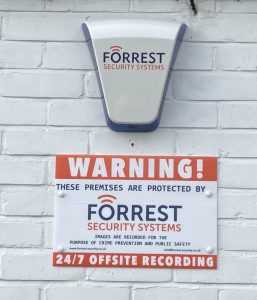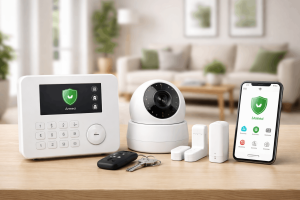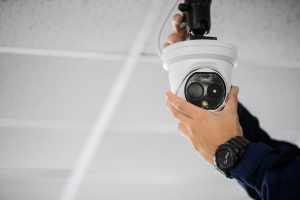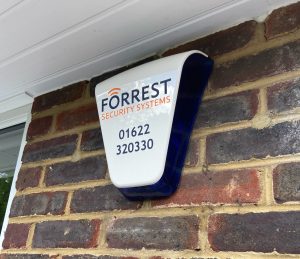When it comes to safeguarding your business, having a reliable burglar alarm system is one of the most critical steps you can take. A well-chosen security solution not only protects your assets but also provides peace of mind to employees and customers alike.
Businesses, regardless of size or sector, face unique challenges when it comes to security, and a generic one-size-fits-all alarm system may not suffice.
The risks associated with burglary and theft can significantly impact your business operations, finances, and reputation. Therefore, understanding the different types of alarm systems available and choosing the one that best suits your business’s requirements is crucial.
This blog aims to guide you through the process of selecting the right burglar alarm by examining key considerations such as your business’s specific needs, types of alarms, integration possibilities, and more.
Assess Your Business’s Security Needs
The first step towards choosing an effective burglar alarm is assessing the specific needs of your business. This begins with evaluating factors like the size, location, and layout of your premises.
For instance, a large warehouse might require an extensive alarm system with multiple sensors, while a small retail shop could benefit from a simpler yet robust setup.
High-risk areas such as entry points, locations with high-value items, and poorly lit zones must also be identified and prioritised.
It’s recommended to carry out a professional security audit to pinpoint vulnerabilities. An expert can provide valuable insights into where your business is most at risk and what kind of alarm systems would offer the most effective protection.
By thoroughly understanding your business’s unique security landscape, you can make a more informed decision when choosing an alarm system tailored to your needs.
Types of Burglar Alarms
When selecting a burglar alarm, it’s essential to understand the different types available. Broadly, burglar alarms can be categorised into wired and wireless systems. Wired systems tend to be more reliable and secure, making them ideal for larger premises.
On the other hand, wireless systems offer greater flexibility and are easier to install, making them a popular choice for smaller businesses. Each type comes with its own advantages, and the best choice will often depend on your business’s scale and layout.
Another important distinction is between monitored and unmonitored alarm systems. Monitored systems are connected to a security company or a monitoring centre that alerts the relevant authorities in the event of an alarm trigger.
This provides an added layer of security and assurance, especially for businesses that may not have 24/7 on-site personnel. Unmonitored systems, however, can still be effective for smaller businesses or those operating in lower-risk areas.
Integration with Other Security Systems
Choosing a burglar alarm isn’t just about picking the right system; it’s also about ensuring it works seamlessly with your existing security setup. Many modern alarm systems can be integrated with CCTV cameras, allowing business owners to monitor their premises visually and receive real-time alerts.
This integrated approach enhances the overall effectiveness of your security measures, ensuring that if an alarm is triggered, there is a clear record of the event.
Additionally, advancements in smart technology mean that alarms can now be integrated with mobile devices, enabling remote access and control. This allows business owners to arm or disarm their systems and monitor activity remotely.
Such capabilities are especially valuable for businesses with multiple locations or those requiring high-level, real-time monitoring and intervention.
Compliance with Legal and Insurance Requirements
When choosing a burglar alarm system, it’s essential to be aware of local regulations that may apply to your business. Depending on your industry or the nature of your premises, there could be specific security requirements that must be adhered to.
For example, businesses handling sensitive data or valuable goods may be legally required to install particular types of security systems. Compliance is not just about avoiding penalties but also about ensuring that your security measures meet a minimum standard of effectiveness.
Additionally, insurance providers often take the quality of your security systems into account when determining premiums. Having an appropriate and well-maintained burglar alarm system can potentially lower your insurance costs.
However, if the system doesn’t meet the required standards or is not properly maintained, you may not be eligible for certain benefits or compensations in the event of a break-in.
Cost Considerations
Balancing cost and quality is a crucial factor in choosing the right burglar alarm. While it might be tempting to opt for a cheaper solution, it’s essential to remember that the cheapest option is not always the most effective.
Investing in a higher-quality system can pay off in the long run, offering greater reliability, fewer false alarms, and better protection for your business. Additionally, businesses should consider the long-term costs of maintenance and potential future upgrades to ensure the system remains effective.
It’s also worth exploring options for spreading the cost through leasing or financing, especially for small to medium-sized businesses with limited budgets.
Consulting with a professional installer can help you identify which systems offer the best balance of cost and functionality based on your business’s specific needs.
Professional Installation and Support
Professional installation of your burglar alarm system is vital to ensuring its effectiveness. Incorrect installation not only undermines the security of your premises but can also lead to a higher number of false alarms.
This can be disruptive to your business and, in some cases, result in fines or a loss of confidence in your alarm system. By working with certified security experts, you can be assured that the system will be installed correctly and configured to meet your business’s requirements.
Moreover, ongoing support and maintenance services are crucial for keeping your alarm system in good working order. Regular checks and updates to your alarm system can help identify and address issues before they become problems.
Having a reliable support service can also provide valuable assistance in case of system failures or unexpected events, ensuring your business remains secure at all times.
Conclusion
Choosing the right burglar alarm for your business is a multi-faceted decision that requires careful consideration of your premises’ security needs, types of alarm systems available, and integration possibilities.
By taking the time to assess these factors, you can ensure that you select a system that meets legal and insurance requirements and provides comprehensive protection for your business.
Ultimately, seeking professional advice and support is the key to making an informed decision. Security experts can offer tailored recommendations based on your business’s vulnerabilities and needs.
By investing in the right burglar alarm system, you can protect your assets, employees, and reputation while achieving the peace of mind that comes with knowing your business is secure.











